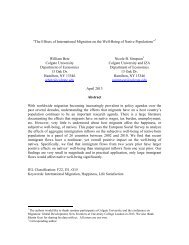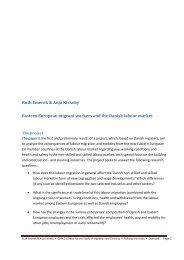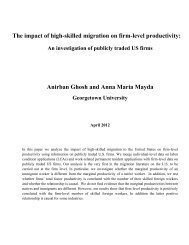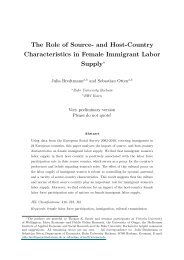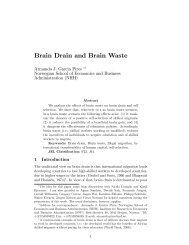La politique française de co-développement - CReAM
La politique française de co-développement - CReAM
La politique française de co-développement - CReAM
You also want an ePaper? Increase the reach of your titles
YUMPU automatically turns print PDFs into web optimized ePapers that Google loves.
integration and moreover facilitated by marginalisation, immigrants <strong>co</strong>nstitute one of the easiest<br />
targets for governments to blame, and for local workers to vent against. While primarily mediatised<br />
in the North during the recent financial crisis, it was also an occurrence in the South. In 2008, for<br />
instance, the governments of the Dominican Republic and Malaysia used the generally negative<br />
sentiment of the financial crisis as an opportunity to send home thousands of immigrants with<br />
irregular status. A similar political reaction occurred during the 1997-1998 Asian financial crises<br />
(Koser, 2009).<br />
2.4. Why immigrant integration matters<br />
As the number of immigrants in <strong>de</strong>veloping <strong>co</strong>untries rises, problems related to social <strong>co</strong>hesion may<br />
also surface. Like in more <strong>de</strong>veloped <strong>co</strong>untries, where there is a longer tradition of immigration, local<br />
populations do not always view the arrival and settlement of foreign workers favourably. Low-skilled<br />
immigrants, in particular, are often blamed for taking jobs away from locals and applying downward<br />
pressure on their salary and bargaining power. Foreigners then serve as scapegoats for the e<strong>co</strong>nomic<br />
problems of the <strong>co</strong>untry, above all when there is no social safety net in place.<br />
But the lack of integration does not only affect immigrants. Many people gain when immigrants are<br />
successfully integrated, and lose when they are not. As ghettos <strong>de</strong>velop, they be<strong>co</strong>me increasingly<br />
exclusive as a result of a grouped protective measure against xenophobic attacks. They also <strong>de</strong>al a<br />
strong blow to the natural environment and eventually they be<strong>co</strong>me nests of extreme poverty, even<br />
as the <strong>co</strong>untry gets richer. Because these enclaves form the rock bed of very low forms of sanitation,<br />
they act as vectors for resistant and <strong>de</strong>adly diseases, such as influenza pan<strong>de</strong>mics, tuberculosis and<br />
HIV/AIDS (UN-Habitat, 2010). In addition, without schools and medical clinics, human capital<br />
<strong>de</strong>velopment, and thus social and intergenerational mobility, is halted.<br />
Pockets of extreme poverty not only breed disease and circular poverty traps but also growing<br />
negative sentiments against host native workers and government. There is a risk that the social<br />
<strong>co</strong>ntract ero<strong>de</strong>s while organised crime and popular forms of justice <strong>de</strong>velop. As the infringement of<br />
local laws and customs by immigrants rises, <strong>co</strong>sts also increase for the receiving <strong>co</strong>untry in providing<br />
more administrative services (e.g. police) to maintain or<strong>de</strong>r. In some cases, these tensions escalate to<br />
violence, as recently witnessed in Libya, Mexi<strong>co</strong> and South Africa. Ethnic and racial tensions can even<br />
generate civil unrest and long-term political instability, like it has been the case in Côte d’Ivoire.<br />
Failure to integrate immigrants can have an element of wi<strong>de</strong>r <strong>co</strong>ntagion: it can induce immigrants to<br />
go back (or forced back) to their <strong>co</strong>untries of origin and spread <strong>co</strong>nflict. For instance, migratory<br />
movements were partially to blame for the expansion and length of the <strong>co</strong>nflict in the late1990s:<br />
<strong>co</strong>nflict in Rwanda quickly engulfed Angola, Burundi, the Democratic Republic of the Congo and<br />
Uganda into their own <strong>co</strong>nflicts. Ac<strong>co</strong>rding to Fearon and <strong>La</strong>itin (2010) more than half (53%) of all<br />
wars from 1945-2008 were ethnic in nature. In this regard, pressure to <strong>de</strong>port Zimbabweans back to<br />
their <strong>co</strong>untry from South Africa has incited arguments that it would lead to <strong>co</strong>nflict in Zimbabwe, as<br />
many immigrants would certainly face persecution upon their return.<br />
Forced return, particularly in tense political climates, tends to ero<strong>de</strong> social <strong>co</strong>hesion. But an<br />
intolerant stance on immigration is growing worldwi<strong>de</strong> and <strong>de</strong>portations of immigrants with irregular<br />
13



